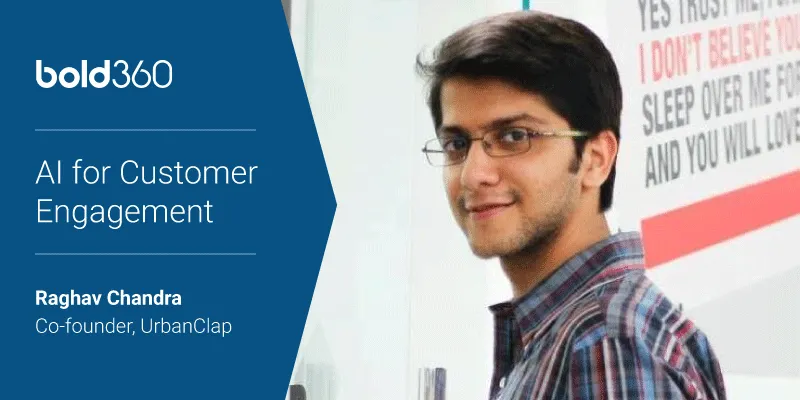
Bold360
View Brand PublisherFrom beauty to home repairs, how UrbanClap leverages AI to serve over 2 million customers
UrbanClap, India's largest home services marketplace has built a network of 100,000+ hand-picked service professionals, and served over 2 million customers across major metropolitan cities of India, since its inception in 2014.
At any point in time, UrbanClap has to make tons of decisions from capturing what the customer wants, scheduling a service-time, and helping a service-professional fulfil the service itself. This happens for over 300,000 customers a month in over 80 unique categories, in 300 hubs within 10 cities in India. The only way they are able to make those decisions, optimise for quality and control the experience is by "codifying" the decision-making criteria which traditionally would have been made by human intelligence. Such a feat is achieved by leveraging technology and AI to automate decision making.

“At UrbanClap,” says Raghav Chandra, its Co-founder, “we believe that the only way to scale and provide high-quality experience is by tech-led standardisation to track granularly and automate a lot of the decision making by leveraging AI.”
Simplifying the complex user journey
For a customer, booking a service on UrbanClap is a simple two-step process, but there’s a lot that happens in the back-end to ensure that customers get exactly what they want. UrbanClap needs to ensure the most frictionless process. To manage scheduling, they need to look at the total professionals in an area, their historic behaviour to predict their availability, and their routing schedules.
“In the real world, it may be difficult to understand what the customer and the service provider needs because people might not present that information. Gathering the skillset information is one area where offline to online guidelines have gone wrong,” says Raghav. UrbanClap has the advantage of being a tech platform with a lot of data in their bag to leverage. By looking at the historical data of beauticians, they will be able to profile what a particular beautician is good at and what he or she needs to improve on.
Optimising time slots in the right location to facilitate convenience
There are several other problems UrbanClap is solving on their platform using AI. The problem isn’t necessarily with scheduling, but in knowing the information beforehand. It’s difficult to predict the availability of a service provider beforehand. Matching demand and supply in the right region without failing to meet the customer’s requirements is a task made easier with AI.
UrbanClap also studies the past work pattern of providers to infer if they have slack days or if they’re extra enthusiastic during a certain time of the week. Using this information, they can match the demand and supply at any given time. Logistics also plays an important role as most service providers will have equipment to carry with them. A spa therapist who has to carry a bed will have more cumbersome logistics as opposed to a plumber who already has a bike. It’s important to consider these details and ensure that the app is super hyperlocal so that they can travel easily.
Personalising the user experience on the platform
In the offline world, if you are extremely satisfied with a service, you can always call the provider and ask for that person again. The same goes for UrbanClap, where the comfort of the customer is of utmost importance. The app saves highly rated professionals separately so that users can check their calendar and book them if they are available. “You want to, as a marketplace, support all the key use cases in the real world because ultimately, our business isn't that of content, it's actually driving real-world service experience,” explains Raghav.
This is where AI and Machine Learning comes into the picture. You don’t even have to call to check if the professional is available, it’s UrbanClap’s job to make sure that happens.
Pricing controls scheduling
The data they collect is personalised to every professional because ultimately, their trend is UrbanClap’s inventory. UrbanClap uses algorithms and AI/ML technologies to match time slots, skills and inventory to finally show the availability to the user. There’s also the pricing angle, where certain service providers will choose to or not to accept a booking based on how much they will get paid. If a plumber takes up a job which pays Rs 200, but must pay Rs 100 for the travel charge, it isn’t feasible. Pricing also dictates scheduling to a large extent. If UrbanClap suddenly increases the price of a service, the probability of professionals accepting a booking increases, but customer demand decreases and vice versa.
Capturing minute details to maintain discipline
UrbanClap has an ideal algorithm in place to capture the purchase and inventory for all service providers on the app, so that they don’t have to manually log in their details every time they make a purchase. Their technology also records other minute details till a process is completed. These include the inventory they use in real-time, what’s left, whether the provider wore their uniform while meeting the customer, whether they started on time, and more. Individuals upload selfies with their uniform which are detected through geotargeting and timestamps to ensure they are honest in their work process.
UrbanClap believes that it’s important to understand the reason behind why they would cheat. Simply making it difficult for them to not do it will never solve the problem, because they would do it again. Most providers resort to cheating customers when they feel the pinch of high pricing. UrbanClap wants to deliver the products automatically to their providers every week by predicting their consumption, so that they don’t have to go through the hassle of buying it once it gets over. Since most of the products are charged less than what they would procure from the market, the pricing burden is lifted off their shoulders.
Training and onboarding with AI
UrbanClap believes in providing contextual training and not classroom training. They analyse and train providers on multiple aspects like charging the customer right, improving skill sets, showing up on time, etc. The entire training module is available on the app, where providers can go through a set of interesting activities and using AI, can learn the right material at the right time. AI is also used to figure out if a certain professional is lagging during a module and ensures that an alert is raised to ensure that he goes through the material before taking up a job.
“It is important to drive disciplined behaviour through the right incentives, nudges, penalties and communication. Training is not just about content, we’re trying to automate discipline in everything they do,” says Raghav. A lot of algorithms are used to assist the decision-making process on what channel to use to solve a problem.
When it comes to onboarding, they need to decide which areas to onboard professionals in and there’s a fair bit of analysis and data-driven learning that happens behind the scenes to verify their credentials. They also identify localities with high customer demand and hire more professionals in that area.
Reaching out to Tier 2 cities
UrbanClap is planning to move into Tier 2 cities, but the challenge is to reach out to a majority who are less tech savvy. If a customer wants a service in a city, there are 80 possible flows that happen just to place an order. Since there are so many ways to do it, it translates to a lot of personalisation. For first-time consumers, they bring out a much simpler flow so that data is not cluttered.
On UrbanClap’s future plans, Raghav says, “Don’t be surprised if we expand into Tier 3 cities and skip Tier 2 cities because it’s a very interesting learning. If we can build something in a Tier 3 city, then building anything between Tier 1 and 2 becomes easy because now we know what it takes," he concludes.
This article is part of the thought leadership articles in collaboration with LogMeIn. The series features prominent founders or C-Suite leaders from renowned firms talking about how they are working with AI to successfully transform their business. Take a look at some of the other articles from the series.







